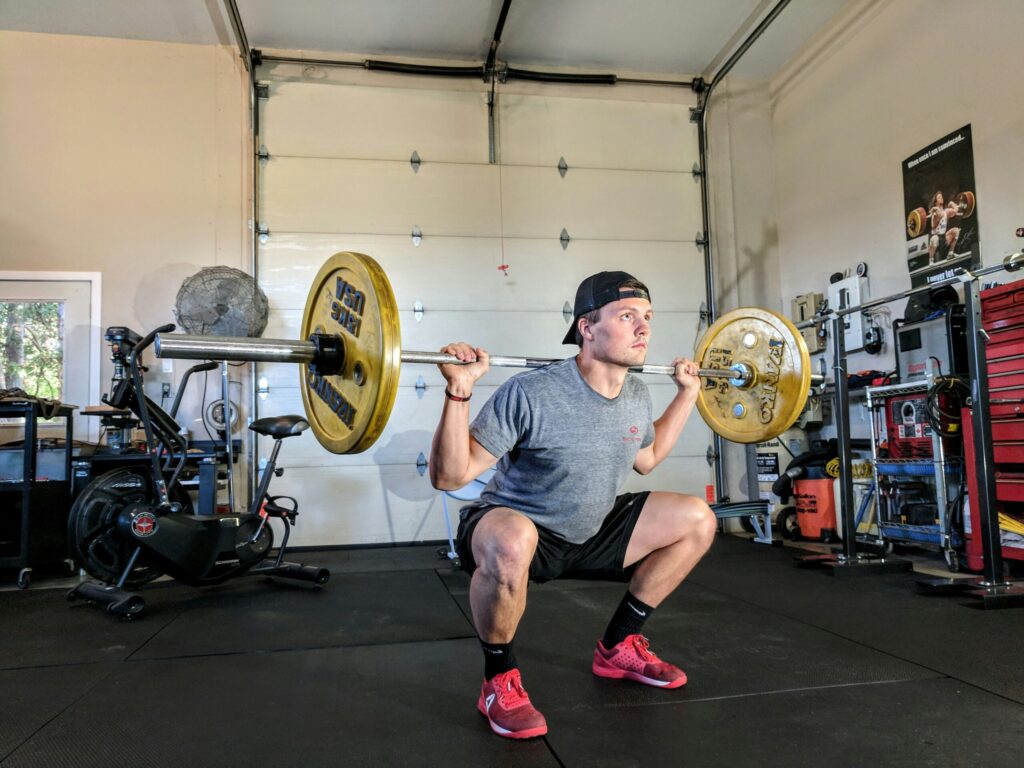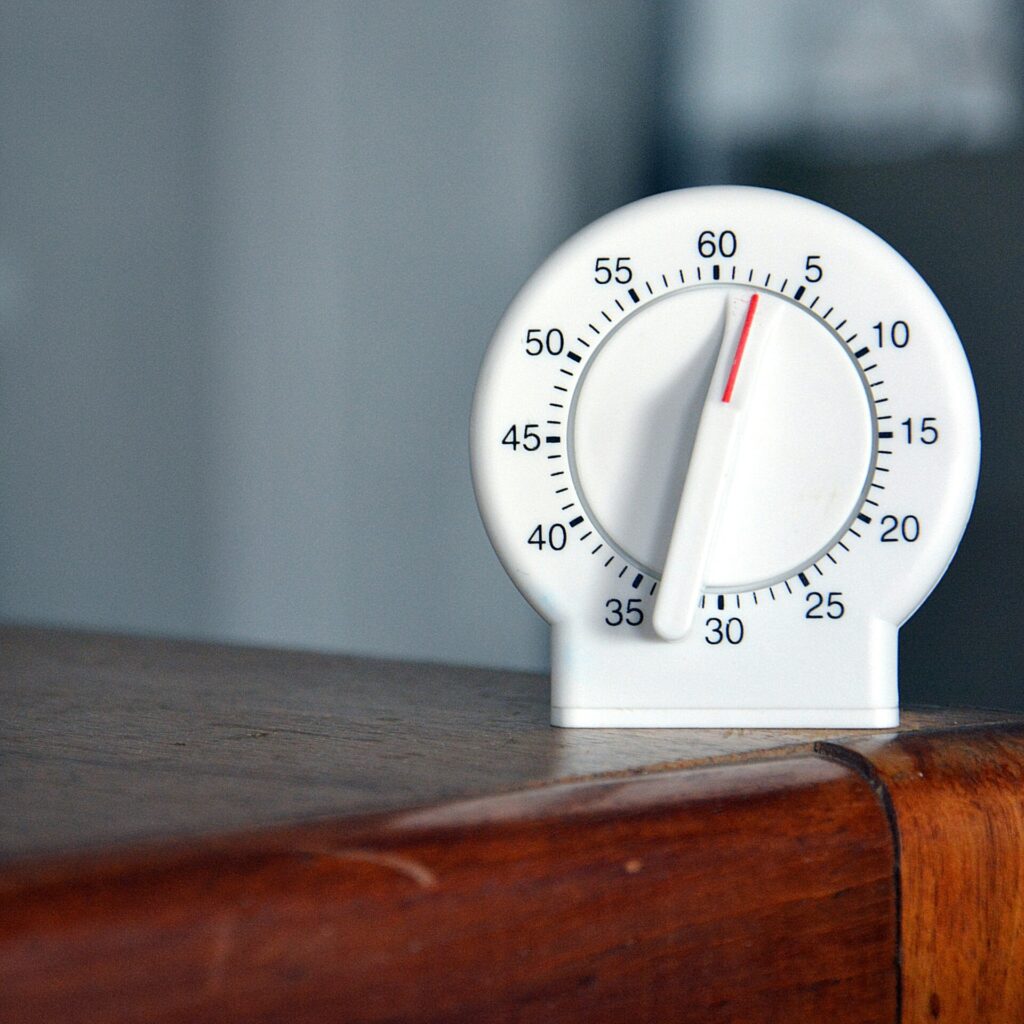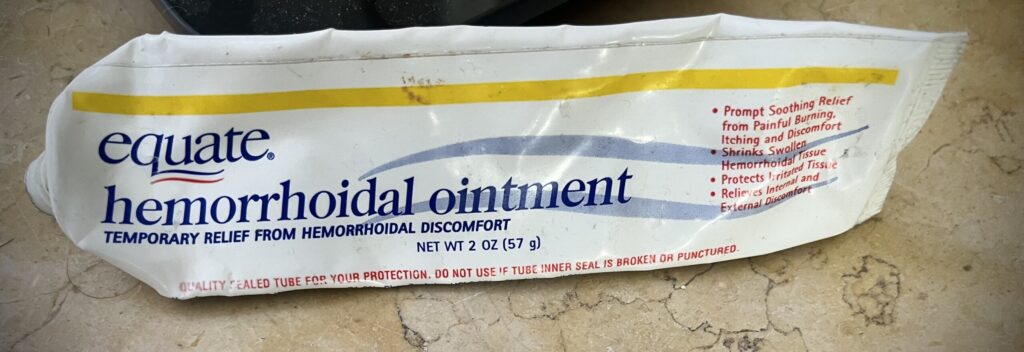Did you know that you can get hemorrhoids from lifting weights if your load is too heavy or your form is incorrect? Also, if you already have hemorrhoids, lifting weights can worsen your condition if you don’t take proper care. So, if you want to engage in strength training without developing swollen veins in or around your rectum, follow the precautions highlighted in this post and speak to a healthcare professional before starting any new exercise routine.

How Could You Get Hemorrhoids from Lifting Weights?
Several common mistakes that weightlifters make could cause hemorrhoids to develop or worsen. But what are those mistakes?
Choosing weights that are too heavy
You can get hemorrhoids from lifting if you choose weights that are so heavy, you have to strain when picking them up. That straining can put pressure on the abdomen and rectum. In turn, there will be addition strain on the blood vessels in those areas, which could cause them to swell, leading to new or worsening hemorrhoids (also known as piles.)
Messing up on form
In lifting, your form describes the technique you use to get weights off the ground. Proper form can help prevent hemorrhoid formation by keep stress off your lower abdomen and rectum. To stay safe, make sure to bend the knees before taking weights off the ground. Keep your back flat and don’t round your shoulders during the lift. Move smoothly, avoiding any jerking motions when possible. And throughout the movement, make sure to breathe steadily, since holding your breath increases the amount of pressure hitting your lower body, thereby increasing your risk for hemorrhoid formation.
Stay Safe when Lifting Weights with These Hemorrhoid Prevention Tips
Whether you’re new to weight lifting or simply trying to increase the load you’re working with, slow progress is key to preventing hemorrhoids. Don’t lift the heaviest weight you can handle on your very first training session, and limit yourself to 12 repetitions in each set to avoid straining yourself. Be sure to engage in other forms of exercise to help strengthen muscles that can support your weight lifting. And always make sure you’re drinking lots of fluids after any exercise session, since dehydration can lead to constipation, another risk factor for hemorrhoids.
Living with Hemorrhoids: When to Seek Medical Attention
Even if you get hemorrhoids from lifting weights, these swollen veins don’t typically pose a serious threat to your health. However, your hemorrhoid symptoms could include itching, pain or bleeding with bowel movements, interfering with your quality of life and causing discomfort as you try to make it through your daily activities.
Luckily, you don’t have to live with these hemorrhoid symptoms, and you no longer need to seek out surgery in order to find lasting relief. Here at the Georgia Hemorrhoid Institute, we can treat your piles with Hemorrhoid Artery Embolization (HAE), shrinking them by cutting off their blood supply using minimally invasive interventional radiology techniques. You can request a consultation today to learn more about this treatment option.
if you have hemorrhoids, that means you've developed merely swollen, inflamed vessels either in or around your anal opening. Typically, this is not a major medical concern. At the same time, anal cancer and other diseases share common symptoms with hemorrhoids. For that reason, some people worry that their hemorrhoids mean cancer has developed. Luckily, we can help you differentiate between each concern with the information highlighted in this post.

Hemorrhoid Symptoms
Hemorrhoids can form outside of your anus (external hemorrhoids), and that may lead to itching, discomfort, and/or swelling. They can also form inside the anus, causing less pain but leading to other hemorrhoid symptoms such as rectal bleeding, leaking mucus, itching and protruding vessels.
Anal Cancer Symptoms
Though having hemorrhoids doesn't mean you have cancer, these conditions do have overlapping symptoms. The American Cancer Society notes that anal cancer symptoms can include anal bleeding and abnormal discharge as well as itching around your rectum. Now, while these concerns could also be signs of hemorrhoids, there are additional cancer symptoms that are separate and distinct. These include :
- A lump or mass that forms at the anal opening
- Feelings of fullness or pain in the anal region
- Loss of control over or changes to bowel movements
- Lymph node swelling in the groin or anus
Symptoms of Hemorrhoids & Cancer: When to Seek Intervention
if you're dealing with mild hemorrhoid symptoms, you can probably find relief at home by making simple changes. Try to drink more fluid and eat more fiber to alleviate any constipation and pass bowel movements with greater ease. Even if you are constipated, don't sit on the toilet for too long, and try not to strain when you pass a bowel movement.
Are your symptoms persisting or worsening, even with these lifestyle changes to manage hemorrhoids? Are your experiencing any kind of rectal bleeding? If you answered yes to either question, you should see a doctor right away, to make sure you are dealing with hemorrhoids and not cancer symptoms. Then, if you are diagnosed with internal hemorrhoids you can request a consultation with the Georgia Hemorrhoid Institute to discuss your treatment options.
Hemorrhoids, also referred to as piles, develop due to swelling in the blood vessels and tissue around and in your anus. They can leave you experiencing discomfort, itching or bleeding with bowel movements. But is there a connection between your hemorrhoids and gas or bloating? Keep reading to find out.

Can hemorrhoids cause gas?
You won't develop gas as a direct result of having hemorrhoids. But internal hemorrhoids can make it harder for you to pass stool or gas comfortably. So gas may build up over time, and you could become painfully bloated.
Addressing hemorrhoids and gas
When you have hemorrhoids and gas, you could relieve bloating and constipation by adding more fiber to your diet. Avoiding gum chewing can also reduce gas buildup, as can eating and drinking slowly and mindfully, without talking while you chew or swallow. And you can relieve gas and other hemorrhoid symptoms with dietary changes.
Start by eliminating foods that trigger gas buildup, such as:
- High fructose corn syrup
- Sorbitol, erythritol and other sweeteners ending in 'ol'
- Products containing dairy
- Chickpeas, beans and other legumes
- Whole grains
- Broccoli, cabbage, cauliflower and other cruciferous veggies
Managing other hemorrhoid symptoms
Common, direct symptoms of hemorrhoids include:
- Pain
- Itching
- Passing stools with bright red blood
People with internal hemorrhoids may experience protrusion from the anus, a condition referred to as prolapsing. Some prolapsed hemorrhoids can be manually repositioned inside the anus, but others will only be resolved through medical intervention.
Hemorrhoid treatment options
Mild hemorrhoids can be addressed with home care and lifestyle changes. Many patients can find relief from a diet to help hemorrhoids. You should also reduce time spent sitting, particularly in the bathroom. You may also benefit from soaking in warm, shallow water or applying over-the-counter hemorrhoid creams to areas of inflammation.
After having a bowel movement, avoid vigorous wiping and try instead to gently pat yourself clean. You could also ditch the TP in favor of medicated wipes. (Just be sure they're flushable to avoid plumbing concerns.)
Finally, if you need to relieve grade 2 or 3 internal hemorrhoids, it may be time to explore a medical procedure for symptom relief. Here at the Georgia Hemorrhoid Institute, we perform hemorrhoid artery embolization (HAE), a minimally invasive procedure to shrink hemorrhoids without surgery, simply by limiting blood supply to the swollen vessels. Simply [tx-appt-link] request a consultation [/tx-appt-link] and we'll work together to decided if you’re a candidate for HAE.
Millions of people around the world are impacted by internal and external hemorrhoids. And the internal hemorrhoids are harder to treat since they affect a blood vessel network called the corpus cavernosum recti (CCR). In the past, this fact made it much harder to find lasting relief for internal hemorrhoids. However, today, there is a procedure called hemorrhoid artery embolization (HAE) that delivers lasting relief from painful and disruptive symptoms such as prolapsing or chronic bleeding.

What is hemorrhoid artery embolization?
HAE is an internal hemorrhoid treatment that provides relief by reducing blood flow to the affected vessels. To do this, doctors make a small incision and insert a catheter to your vessels, guiding it to the ones that feed the hemorrhoids. From there, they can deposit embolic material to reduce blood, shrinking the hemorrhoids without damaging surrounding tissue. In turn, you experience relief from hemorrhoids symptoms. But you can avoid side effects such as anal incontinence and rectal wounds. But how long does hemorrhoid artery embolization last when it comes to relief?
How long does hemorrhoid artery embolization last?
HAE has a 95% technical success rate, offering the best results for people who have grade 2 or 3 internal hemorrhoids. However, if you have grade 4 hemorrhoids, you may need to seek hemorrhoid removal surgery or other, more invasive, procedures.
Of course, HAE is still a newer internal hemorrhoid treatment option. So there isn't a lot of information on its long term results. However, with the data available now, it's clear that as many as 75% of patients report ongoing, significant symptom relief at the 12-month post-procedure follow-up. Furthermore, as a minimally-invasive, non-surgical procedure, you can undergo HAE multiple times, still avoiding general anesthesia and overnight hospital stays. Plus, because it’s the least invasive treatment available for grade three internal hemorrhoids, it offers the promise of lasting relief for those who choose to or must avoid surgical procedures.
HAE Procedure in Georgia
Our Georgia interventional radiologists offer HAE treatment to patients with grade 2 and 3 internal hemorrhoids, allowing for less pain; shorter recovery periods; and minimal post-procedural discomfort. But are you a candidate for hemorrhoid embolization? Click here to request a consultation at the Georgia Hemorrhoid Institute, where you can explore your treatment options.
In order to get rid of hemorrhoids, you'll need to explore your treatment options. Depending on the severity of your symptoms, you may be able to find relief at home. If, however, you're experiencing more severe symptoms, such as itching, pain or bleeding, a medical procedure may be your best hope for relief. But how can you decide on your best treatment option? Here's what you need to know.

Get Rid of Hemorrhoids: 3 Treatment Options
When you have mild to moderate hemorrhoid symptoms, you may be able to treat your condition from the comfort of home. Try following this special diet for hemorrhoids, to see if you can ease constipation, and relieve your symptoms naturally.
Need a bit more help for hemorrhoids? Over-the-counter topical creams can help with swelling and itching, as long as your condition has not progressed too far.
But if you've been diagnosed with stage 2 or 3 hemorrhoids, you are unlikely to find relief at home or in the drugstore. Instead, consider Hemorrhoid Artery Embolization (HAE) in Georgia, a minimally invasive medical procedure that treats internal hemorrhoids without surgery.
Medical Support to Get Rid of Hemorrhoids
Thanks to advances in our practice of interventional radiology, we can now relieve the symptoms of stage 2 and 3 internal hemorrhoids without surgery. Instead, we can perform the HAE procedure, reducing the flow of blood to the hemorrhoids with embolic materials deposited to the arteries via catheter and guided by x-ray imaging. With this procedure, you can get rid of hemorrhoids while avoiding general anesthesia, surgical incisions and overnight stays in the hospital. Even better? When compared to surgery, HAE causes fewer complications and is associated with a faster recovery period. Want to see if you're a candidate for this procedure? Click here to request an appointment at the Georgia Hemorrhoid Institute. We can help determine if this procedure is your best treatment option.
Are you interested in using cream for hemorrhoids for symptom relief? Well, if you have a mild case of hemorrhoids, you may get what you're looking for from these over-the-counter products. But in some cases, your story could turn out quite differently. In fact, one woman in California recently died after purchasing and using a topical hemorrhoid ointment over the internet.

What was Dangerous about the Cream for Hemorrhoids?
If you have hemorrhoids, you may be seeking relief from creams such as Recticare or Preparation H with lidocaine. However, the woman in California went in a different direction, pursuing 'natural' treatments online. As such, she purchased an herb-based Vietnamese ointment called Cao Boi Tri Cay Thau Dau. Or so she thought,
Tragically, the woman died shortly after using the ointment. After her passing, authorities tested the product and discovered it was laced with toxic lead levels. As such, her decision to seek hemorrhoid symptom relief ultimately led to her death by lead poisoning.
Longer Lasting Symptom Relief
Clearly, such a tragic story is rare. Typically, patients who purchase brand name cream for hemorrhoids, from reputable drug stores will remain unharmed. But if you have a moderate to severe condition, you are unlikely to find relief from topical treatment options.
Are you suffering from symptoms such as itching, bleeding when passing bowel movements, and discomfort? Would you like to find symptom relief but prefer to avoid surgery? Well, you can, if you choose to undergo Hemorrhoid Artery Embolization (HAE). This medical procedure effectively treats stage 2 and 3 internal hemorrhoids without the need for invasive surgery or an overnight hospital stay. Want to learn more? Click here to request an appointmentat the Georgia Hemorrhoid Institute.
If you have painful hemorrhoid and want to naturally relieve your symptoms this read is for you. Of course, not every case of hemorrhoids can be managed at home. But, if your condition is less severe, you can try managing hemorrhoids with these four simple moves.

4 Keys to Managing Hemorrhoids At Home
Do you want to naturally relieve your pesky hemorrhoid symptoms? Try incorporating these simple lifestyle moves!
Get more fiber
Following a diet for hemorrhoids, with fiber at its center, can help soften your bowel movements. In turn, you're less likely to strain when you're in the bathroom. And that can relieve existing hemorrhoids while preventing new ones from forming.
Take a soak
If you want to relieve hemorrhoids, hop in the tub and take a warm soak! To add soothing properties, pour some Epsom salt into the water and stay put for a minimum of 15 minutes. And once you're out of the water? Use a patting, not a rubbing, motion, to completely dry the skin of your perineum.
Don't sit for too long
Whether you're sitting too long on the toilet, at your desk, or behind the wheel, spending lots of time on your butt can aggravate your hemorrhoids. So, to relieve existing hemorrhoids and avoid forming new swollen vessels in or around your anus, make sure to get up every hour or so instead of sitting too long at the party.
And workout more often
By exercising regularly, you will sit less. Also, you may relieve mild constipation, and lose some weight, which could also help relieve some of your hemorrhoid symptoms.
Managing Hemorrhoids with Medical Procedures
At home care for hemorrhoids can relieve symptoms for patients with mild conditions. However, if you have been diagnosed with stage 2 or 3 internal hemorrhoids, you will likely need medical support to treat your condition. Want hemorrhoid relief, but want to avoid invasive surgery? Click here to request an appointment with our hemorrhoid specialists in Georgia, to see if you're a candidate for hemorrhoid artery embolization!
Here at the Georgia Hemorrhoid Institute, we offer stage 2 and 3 internal hemorrhoid treatment with minimally invasive Hemorrhoid Artery Embolization (HAE). But how can you decide when to seek treatment for hemorrhoids? Why do hemorrhoids form in the first place? And what are your treatment options? This post will answer these questions and more!

Understanding hemorrhoids
Hemorrhoids are swollen veins. They can form inside the rectum or around the anal opening. Your grade of hemorrhoid will be based on the severity of your symptoms, from mild to severe. And those symptoms may include itching, bleeding pain and prolapsing veins, among others.
Why do I have hemorrhoids?
You may develop hemorrhoids if:
- You have a diet low in fiber
- You must strain to pass a bowel movement
- You sit for long periods of the day, particularly when using the bathroom
- You're pregnant or just had a baby
- Obesity is a concern
- You're lifting heavy objects
Once hemorrhoids form, you may find them inside the rectum) or under the skin surrounding the anus. While external hemorrhoids may be more painful, internal hemorrhoids can cause more concerning symptoms such as bleeding with bowel movements.
When to seek treatment for hemorrhoids
Mildly symptomatic hemorrhoids can be managed with simple lifestyle changes. Try drinking more water and eating more fiber to reduce straining. You may also find relief by taking an over-the-counter stool softeners or by applying hemorrhoid cream to external veins.
Sometimes, these methods will quickly resolve your problem. But if you're bleeding when you pass bowel movements, it's time to start considering when to seek treatment for hemorrhoids. And you should certainly seek medical intervention if symptoms persist or worsen, or if you've noticed a prolapsed hemorrhoid. (A bulge that comes out of the anus. Sometimes it can be manually returned into the rectum, but in more severe cases, it remains prolapsed, even with manual replacement.)
Finally, if your symptoms are disrupting your life or causing undue distress, Click here to request an appointment with our hemorrhoid experts in Georgia. When we see you at your appointment, we can help you decide when to seek treatment for hemorrhoids, and determine if you’re a good candidate for hemorrhoid artery embolization.
Internal hemorrhoids can cause symptoms like bleeding when you pass stool. For most patients, that symptom is scary, but not a serious medical concern. Sometimes, however, bleeding hemorrhoids could require immediate medical attention. So, how can you identify the dangers of bleeding hemorrhoids? And can treatment prevent complications? Here's what you need to know.
Types of Hemorrhoids
Your hemorrhoids may form internally, inside the rectum, or externally, surrounding the anal opening. Both internal and external hemorrhoids may bleed, but this symptom is most frequently associated with internal hemorrhoids, especially if you notice bright red blood with bowel movements. Usually, the bleeding isn't dangerous. However, internal hemorrhoids can also cause itchiness and discomfort, causing many patients to seek relief through treatment.

When do Hemorrhoids Bleed?
Hemorrhoids may bleed for a number of reasons. Most often, you'll notice bleeding when you strain to pass stool; the pressure may damage the hemorrhoid surface, causing bleeding.
Less commonly, bleeding is a sign that a hemorrhoid has burst, and that can be a more serious concern. Rarely, hemorrhoid formation damages your delicate surrounding skin, causing bleeding due to ulceration. However, most patients can avoid these complications by seeking timely hemorrhoid treatment.
Are There Dangers of Bleeding Hemorrhoids?
Can bleeding hemorrhoids be dangerous? In fact, they can, if your hemorrhoids become thrombosed (an internal blood clot forms). Thrombosed hemorrhoids may rupture and lead to heavy bleeding, requiring immediate medical attention. Yet you can usually avoid this complication by treating your hemorrhoids when their symptoms are still less severe.
Seeking Treatment Can Prevent Dangers of Bleeding Hemorrhoids
As soon as you notice bleeding hemorrhoids, it's time to start exploring treatment options. At the Georgia Hemorrhoid Institute, we perform minimally invasive hemorrhoid artery embolization (HAE) to treat stage two and three internal hemorrhoids. This option provides relief from bleeding, while allowing you to avoid surgery and overnight hospital stays.
Ready to relieve your bleeding hemorrhoids? Our specialists are prepared to help! Click here to request an appointment with our hemorrhoid specialists in Georgia.
Hemorrhoids cause many disruptive symptoms. These include itching, bleeding and discomfort in and around your anus. But can you have intercourse with hemorrhoids? Here's the low down on getting busy with this condition.

Undertsanding Hemorrhoids
Hemorrhoids (or piles) are enlarged veins that develop in your rectum or anus. We can diagnose this condition using a scale of severity, ranging from Grade 1 to Grade 4.
- Grade 1 hemorrhoids are small, usually invisible and not palpable. They may bleed when you pass bowel movements, but are unlikely to hurt.
- Grade 2 hemorrhoids are larger, and may protrude from your anus during bowel movements. They can also cause pain, itching and bleeding.
- Grade 3 hemorrhoids bulge out of the anal canal, only returning inside with manual repositioning. They also cause disruptive symptoms.
- Grade 4 hemorrhoids bulge out of your anal canal, even after manual repositioning. They cause severe symptoms.
Having intercourse with hemorrhoids
Your sex life may be unaffected by less severe hemorrhoids. But with grade two, three or four hemorrhoids, it may be too painful to engage in anal or vaginal penetration. Of course, you can find other ways to connect intimately while you explore your hemorrhoid treatment options. But seeking medical intervention is likely the only way you'll be able to fully re-engage in a unimpeded sex life.
Hemorrhoid Treatment in Georgia
Here at the Georgia Hemorrhoid Institute, we perform Hemorrhoid artery embolization (HAE), a non-surgical procedure that relieves grade two and three hemorrhoids symptoms. Unlike surgical hemorrhoid removal, it comes with a faster recovery period, along with fewer side effects and minimal discomfort.
Are you having difficulty engaging in intercourse with hemorrhoids? Are you ready to find lasting symptom relief? Click here to request an appointment with our hemorrhoid experts in Georgia.






